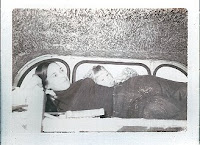
We had another huge garage sale where hundreds of things got exchanged, sold, given away with delight all around. Canning jars, plants, and shelves went free to the Food Conspiracy, the washer and television to a neighbor, bookshelves to young couples, clogs, dresses, etc., to people who wanted them, a trowel to a man who accepted it without a word and then walked away, tiny things to little kids, paintings to people who liked them, a guitar exchanged for a Japanese radio.
Today JF is touching up the paint on the bus. The scotch-soaked barrel which provided all the free drinks has been sawed into a kind of bathtub or chair or something.
These are the books (besides the Calvert School books, which are furnished by the school) we decided to take along.
1. Revised Standard New Testament
2. Zen Flesh, Zen Bones
3. Zen in the Art of Archery
4. Jung: Psychology and Religion
5. Gandhi (children's biography)
6. Book of the Hopi
7. The Tarot
8. The I Ching
9. Yoga and Health
10. Wood, Concentration
11. Yogananda, Meditations
12. Speak Truth to Power (Quaker pamphlet)
13. The Pilgrim's Progress
14. Bhagavad Gita
15. King James Bible
16. Mishra's Fundamentals of Yoga
17. Elytis, Prosanatolismoi (poetry)
18. Simone Weil, The Iliad (Quaker book)
19. The Light Around the Body (Robert Bly, poetry)
20. Fifteen American Poets
21. Wordsworth
22. Gitanjali, Tagore
23. Six Poets of Modern Greece
24. A Guide to (Music) Listening
25. Webster's New Collegiate Dictionary
26. Fitzgerald translation, The Odyssey
27. Geology textbook
28. The Sea (Time/Life book)
29. Life
30. Stonehenge Decoded
31. Solar Biology
32. Whitehead, Science and the Modern World
33. The Atom and Beyond, Smith
34. Geographic Star Chart
35. The Universe of Doctor Einstein
36. Adler, How Life Began
37. Asimov, The Universe
38. Man in Space
39. Physics for Everybody
40. Merck Manual (medical)
41. Smaller Classical Dictionary
42. The Golden Bough
43. Aeschylus, Prometheus, etc.
44. Tarn, Alexander the Great
45. Plato, The Last Days of Socrates
46. Herodotus, The Histories
47. Man Before History
48. Erikson, Childhood and Society
49. Harbrace (English) Handbook
50. Pirandello, Plays
51. Edible and Useful Plants
52. Western Birds
53. Stalking the Wild Asparagus
54. Siddhartha, Hesse
55. Milne, When We Were Very Young
56. Robinson Crusoe
57. Stuart Little
58. Berne, Group Treatment
59. Worlds in Collision
60. Morning of the Magician
61. The Once and Future King
62. Kipling, The Jungle Book
63. Modern Spoken Greek
64. Greek Dictionary
65. Automotive Encyclopedia
66. Origami book
67. Macramé
68. Living on the Earth
69. How To Live On Nothing
70. Typewriting book
71. The Times World Atlas
72. Crafts book
Only 28 of these 72 got any use. In addition to this library, we had star charts, AAA maps, various music books, the Rand McNally Campground and Trailer Park Guide, and the Whole Earth Catalog.








































